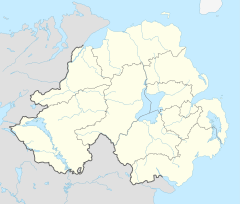Dungiven
Dungiven
|
|
|---|---|
 |
|
| Dungiven shown within Northern Ireland | |
| Population | 2,993 (2001 Census) |
| Irish grid reference | C689024 |
| • Belfast | 53 miles |
| District | |
| County | |
| Country | Northern Ireland |
| Sovereign state | United Kingdom |
| Post town | LONDONDERRY |
| Postcode district | BT47 |
| Dialling code | 028, +44 28 |
| EU Parliament | Northern Ireland |
| UK Parliament | |
| NI Assembly | |
Dungiven (from Irish: Dún Geimhin, meaning "Gevin's fort") is a small town, townland and civil parish in County Londonderry, Northern Ireland. It is on the main A6 Belfast to Derry road. It lies where the rivers Roe, Owenreagh and Owenbeg meet at the foot of the 1,525 ft (465 m) Benbradagh. Nearby is the Glenshane Pass, where the road rises to over 1,000 ft (300 m). It had a population of 2,993 people in the 2001 Census, an increase of 6% over 1991. It is within Causeway Coast and Glens district.
Dungiven sprang up around Dungiven Castle and the Church of Ireland church at the eastern end of the town, later spreading westwards along Chapel Road and Main Street towards the bridging point on the River Roe. Because of the River Roe's flood plain and the line of a proposed by-pass, housing development has been mostly to the east and north of the town. It is an important service centre for the surrounding rural hinterland; offering educational, health, commercial, social, community and recreational facilities.
An interesting site in Dungiven is the 11th century Augustinian priory of St Mary's and the tomb of O'Cahan (Cooey na Gall O' Cahan), laid to rest in 1385. A thicket of thorn bushes hung with rags conceals a bullaun stone, visited for wart cures.
Between the 12th and 17th centuries the area was ruled by the Ó Catháin clan, one of the most influential clans in Ulster and respected throughout Ireland. In the early 17th century they built Dungiven Castle, which - having been substantially rebuilt in the 19th century - remains today as a restaurant and guesthouse. The world famous song Danny Boy is taken from a melody composed by the Ó Catháin bard, Ruairí Dall Ó Catháin. The original version concerns the passing of the Chief Cooey-na-Gall, whose death brought an end to the long line of O'Cahan chiefs.
...
Wikipedia

